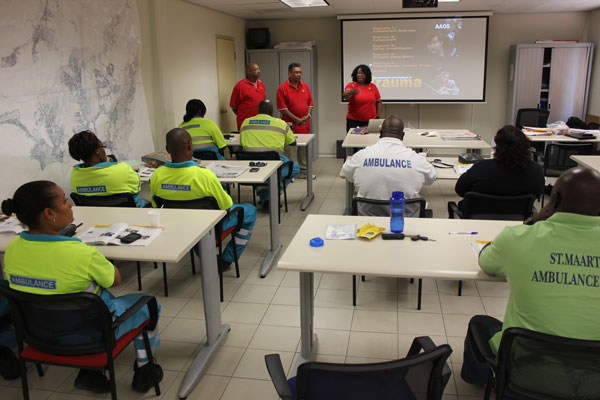 Philipsburg (DCOMM):--- The Ambulance Department is taking part in a week-long, advanced level course in trauma.
Philipsburg (DCOMM):--- The Ambulance Department is taking part in a week-long, advanced level course in trauma.
Minister of Public Health, Labor, and Social Development, Cornelius de Weever, applauds the continuous efforts of the Ambulance Department to keep abreast of the latest developments in the emergency services. "We are all proud of the emergency services that ambulance department provides to the community. With the amount of violent crimes and the amount of road accidents it is essential that the staff of the ambulance is continuously trained especially in trauma."
About 20 persons from the ambulance department took part in the course that focused on trauma and catastrophes. The trauma course helps emergency personnel learn a method that is systematic and important to the early care of the trauma patient, which is essential for the injured patient in emergency situations.
"This is a continuing process," Head of the Ambulance Department Cylred Richardson said, "we have to continual train and update ourselves in order to provide quality service when called upon. The better trained we are, the more prepared we will be."
During the course of this week a specialized group from Worldwide International Emergency Medical Services out of Washington DC provided this intense trauma training. They have gone through several modules and have increased the knowledge level of the Ambulance Department.
The St. Maarten Ambulance Department participated in the latest Health Care Provider American Heart eSimulation technology for CPR (Cardiopulmonary Resuscitation) which was implemented in 2010.
This course included the eSimulation technology where the participants were initially involved in treating patients in a virtual healthcare setting. The eSimulation portion of the course is incorporated in the hands-on skill training sessions which provided the practical training.
Key changes in CPR sequence are "CAB" Compression Airway Breathing change from "ABC" Airway Breathing Circulation, allowing the rescuer to get the chest compressions in less time.
Isos Health (a professional survey firm) along with a CPR Improvement Working Group surveyed more than 1,000 healthcare professionals in the United States, the United Kingdom, France, and Germany to identify attitudes, beliefs, and assumptions among practitioners who perform CPR.
For the second to fifth day of training, the Advanced Assessment and Treatment of Trauma (ATT) course represents the state of the art in pre-hospital assessment and management of the trauma patient based on the most current medical information and best practices.
The St. Maarten Ambulance Department participated in a course that is highly interactive covering the critical knowledge and skills necessary to rapidly evaluate, stabilize and transport the trauma patient. The modules include Patient Assessment, Airway Management, Traumatic Brain Injury, Trauma to the Head and Neck, Trauma to the Torso, and Mass-Casualty Incident Triage exercise.












